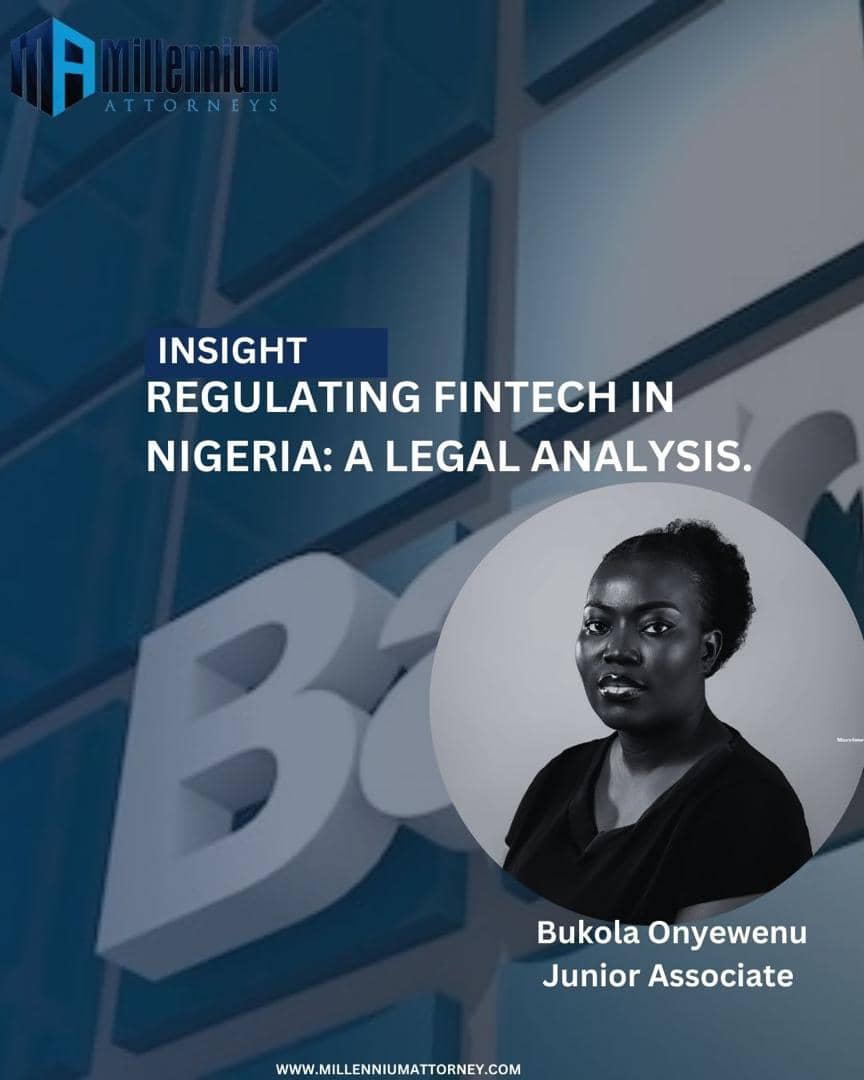INTRODUCTION
In Nigeria, fintech has experienced exponential growth over the last decade, with innovations spanning mobile payments, digital banking, lending platforms, and cryptocurrency exchanges. The growth of the fintech sector could be attributed to the country’s youthful population, increasing mobile penetration, and a drive for financial inclusion.
However, this burgeoning sector has also introduced significant challenges in terms of regulation, consumer protection, maintain market integrity and financial stability. As fintech companies continue to disrupt traditional banking and payment systems, the need for a robust legal and regulatory framework becomes increasingly evident. This article provides a comprehensive legal analysis of the regulatory landscape surrounding fintech in Nigeria, examining the existing laws, the role of regulatory bodies, and the legal implications of emerging trends within the industry. It aims to explore the balance between fostering innovation and ensuring adequate oversight to safeguard the interests of consumers and maintain the integrity of the financial system.
CURRENT REGULATORY FRAMEWORK
Nigeria’s fintech sector is primarily regulated by a range of agencies, including the Corporate Affairs Commission, Central Bank of Nigeria (CBN), the Securities and Exchange Commission (SEC), the Nigeria Deposit Insurance Corporation (NDIC), Federal Inland Revenue Services (FIRS) and the Nigerian Communications Commission (NCC). These bodies issue guidelines, regulations, and oversight to ensure that fintech operators comply with the country’s financial laws.
- CORPORATE AFFAIRS COMMISION: The Corporate Affairs Commission (CAC) is the regulatory body responsible for overseeing the registration, regulation, and governance of businesses in Nigeria. Established by the Companies and Allied Matters Act (CAMA) of 1990, the CAC’s primary role is to ensure the smooth operation of corporate entities in Nigeria, including fintech companies. CAMA, which is Nigeria’s primary legal framework for company regulation, provides the legal foundation for the CAC’s activities, including the registration of companies, maintenance of company records, and enforcement of statutory obligations. CAC plays a critical role in regulating these entities to ensure compliance with corporate governance standards and business practices. Fintechs are required to register with the CAC to operate legally within Nigeria, just like any other business entity. The registration process ensures that fintech companies adhere to the country’s laws, including tax obligations and corporate structure regulations, which are crucial for maintaining transparency and accountability in the sector. Fintech companies in Nigeria, like other businesses, must adhere to certain capital requirements depending on their scope and the type of services they provide. For most fintech companies, particularly those involved in payment systems, lending, or digital banking, the minimum share capital requirement varies according to the type of license they seek and the regulatory body involved. Under the CBN guidelines, fintech companies offering payment services or operating as mobile money operators are typically required to meet specific capital requirements. The minimum capital for these fintech businesses can range from ₦20 million to ₦2 billion, depending on the nature and size of the business.
- CBN’S REGULATORY FRAMEWORK FOR FINTECH: The CBN plays a central role in regulating payment systems and digital financial services. In its Regulatory Framework for Fintech, the CBN has introduced guidelines for operators of digital payment systems, including Payment Service Banks (PSBs). These guidelines seek to enhance financial inclusion by allowing non-bank entities to offer financial services, such as accepting deposits and facilitating payments.
- SEC’S CROWDFUNDING REGULATION: The SEC regulates capital markets, and its regulation of fintech extends to crowdfunding platforms. In January 2021, the SEC released rules for crowdfunding, specifying the operational standards for fundraising platforms. These regulations aim to ensure that crowdfunding operations are transparent and protect investors from undue risks.
- NDIC AND NCC OVERSIGHT: The NDIC ensures that deposits are insured, offering a safety net for fintech deposit-taking institutions, while the NCC oversees telecommunications infrastructure, which is critical for mobile banking and fintech services.
- NATIONAL INFORMATION TECHNOLOGY DEVELOPMENT AGENCY (NITDA): NITDA plays a significant role in regulating data protection and cybersecurity. With the issuance of the Nigeria Data Protection Regulation (NDPR) in 2019, NITDA introduced compliance obligations on FinTech companies processing personal data.
- FEDERAL INLAND REVENUE SERVICES(FIRS): The Federal Inland Revenue Service (FIRS) is the primary regulatory body responsible for tax administration in Nigeria. FIRS plays a pivotal role in ensuring compliance with tax laws and regulations across various sectors, including fintech. The FIRS oversees the collection and administration of taxes such as Corporate Income Tax (CIT), Value Added Tax (VAT), and Withholding Tax (WHT). As fintech companies expand, the FIRS’s role in regulating taxes within the sector becomes increasingly important. The agency has worked to ensure that fintech businesses comply with tax obligations, even as new business models and digital services emerge. This is particularly important as fintech companies often operate across borders, with some offering services in multiple jurisdictions. The FIRS has made efforts to address these complexities through updates to tax regulations and increased collaboration with other regulatory bodies, ensuring a transparent and fair taxation system that supports both business growth and the broader economy.
- ANTI-MONEY LAUNDERING (AML) AND COMBATING FINANCING OF TERRORISM (CFT): The Economic and Financial Crimes Commission (EFCC) and Nigeria Financial Intelligence Unit (NFIU) are involved in preventing money laundering and terrorist financing, which are critical concerns for digital financial services. FinTech companies are required to comply with the Money Laundering (Prohibition) Act, 2011 and similar regulations.
CHALLENGES IN FINTECH REGULATION
While the current regulatory framework is a step in the right direction, there are significant challenges that must be addressed. First, the pace of technological innovation far outstrips the speed at which regulations are made. Fintechs are continuously evolving, introducing new models such as decentralized finance (DeFi), which can make existing regulations obsolete. Key challenges include:
- CONSUMER PROTECTION: The rise of fintech has led to increased consumer participation in financial markets. However, the lack of comprehensive regulations on consumer data protection leaves users vulnerable to identity theft and fraud.
- DATA PRIVACY AND CYBERSECURITY: Nigeria currently lacks specific legislation tailored to fintech-related data privacy issues. The Nigeria Data Protection Act (NDPA) covers general data protection, but more stringent cybersecurity laws and standards may be required to deal with the specific risks posed by fintech.
- ANTI-MONEY LAUNDERING (AML) COMPLIANCE: While the Money Laundering (Prohibition) Act covers AML requirements, fintech firms face difficulties in meeting these requirements, especially when operating cross-border transactions. The absence of harmonized AML laws across countries further complicates compliance.
RECENT DEVELOPMENTS
Recently, in June 2024, the Securities and Exchange Commission (SEC) launched a regulatory incubation programme designed to onboard virtual asset providers in Nigeria through the SEC Finport platform (https://sec.gov.ng/finport/). This initiative marks a significant step in the regulatory recognition and integration of virtual assets into Nigeria’s financial ecosystem. Additionally, the Finance Act of 2023 broadened the scope of chargeable assets to include digital and virtual assets, officially recognizing their role in the Nigerian economy.
Ongoing discussions continue on how best to regulate digital and virtual assets in the country, reflecting the need for a clear and comprehensive legal framework for this emerging sector. In parallel, the Central Bank of Nigeria (CBN) has taken steps to regulate the payment system more effectively. In the first half of 2024, the CBN introduced several guidelines aimed at promoting the smooth functioning and liquidity of the foreign exchange markets, particularly targeting international money transfer services and diaspora remittances. These measures highlight Nigeria’s commitment to creating a more structured and stable environment for both traditional and digital financial services.
The CBN, in collaboration with the National Information Technology Development Agency (NITDA), has developed a Payment System Vision 2020, which outlines the future of payment systems in Nigeria. Additionally, the Nigerian government has been exploring a Fintech Regulatory Sandbox similar to that of the UK, which would allow fintech companies to experiment with new products under temporary regulatory approval. Furthermore, recent court cases, such as CBN v Rise Vest Technologies Ltd, highlight the tension between fintech companies and regulators, especially in relation to cryptocurrency. In this case, the CBN directed banks to freeze the accounts of fintech firms involved in cryptocurrency transactions, reflecting the cautious approach Nigerian regulators take towards digital currencies.
CONCLUSION
In conclusion, regulating fintech in Nigeria is a fine balancing act. While regulation is key to protecting consumers, maintaining market integrity, and ensuring financial stability, it must also allow room for innovation to thrive. Nigeria’s fintech sector holds great potential to drive economic growth and improve financial inclusion, but this potential can only be fully unlocked with a regulatory framework that is flexible and forward-looking. One critical aspect of achieving this balance is having an in-house counsel in fintech companies who can ensure regulatory compliance and guide the company through the evolving legal landscape


